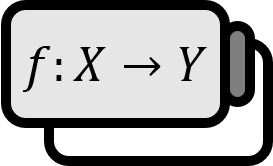Associated Legendre Polynomials
Definition
Associated Legendre polynomials are defined in the following ways.
As a Solution to a Differential Equation
The solutions to the associated Legendre differential equation below are referred to as associated Legendre polynomials.
$$ \begin{align*} && (1-x^{2}) \frac{d^{2}y}{dx^{2}} - 2x \frac{dy}{dx} + \left[l(l+1) - \frac{m^{2}}{1-x^{2}}\right] y &= 0 \\ \text{or} && \frac{d}{dx} \left[(1-x^{2})y^{\prime}\right] + \left[l(l+1) - \frac{m^{2}}{1-x^{2}}\right] y &= 0 \end{align*} $$
Rodrigues’ Formula
The polynomial function $P_{l}^{m}$ below is referred to as the associated Legendre polynomial.
$$ \begin{align*} P_{l}^{m}(x) &= (1-x ^{2})^{\frac{|m|}{2}} \frac{ d^{|m|} }{ dx^{|m|} } P_{l}(x) \\ &=(1-x ^{2})^{\frac{|m|}{2}} \frac{ d^{|m|} }{ dx^{|m|} }\left[ \dfrac{1}{2^l l!} \dfrac{d^l}{dx^l}(x^2-1)^l\right] \end{align*} $$
Here, $P_{l}$ is a Legendre polynomial, and the above formula is known as Rodrigues’ formula.
Description
In the case where $m=0$, the associated Legendre differential equation becomes the Legendre differential equation, and the associated Legendre polynomial becomes a Legendre polynomial. That is, $P_{l}^{0}(x) = P_{l}(x)$. The Legendre differential equation and its solution are special cases of the associated Legendre differential equation.
Properties
Trigonometric Form of the Associated Legendre Differential Equation
The associated Legendre differential equation expressed using trigonometric functions is as follows.
$$ \begin{align*} \frac{ d^{2} y}{ d \theta^{2} }+\cot \theta \frac{ d y}{ d \theta}+ \left( l(l+1) -\frac{m^{2}}{\sin ^{2 }\theta} \right)y=0 \\ \mathrm{or} \quad\frac{1}{\sin \theta}\left(\sin \theta \frac{dy}{d\theta} \right)+ \left(l(l+1) -\frac{ m^{2}}{\sin ^{2} \theta} \right)y=0 \end{align*} $$
Relationship Depending on the Sign of $m$
Associated Legendre polynomials have the following relationship depending on the sign of $m$. (Link)
$$ P_{l}^{-m}(x)=(-1)^{m}\frac{(l-m)!}{(l+m)!}P_{l}^{m}(x) $$
Orthogonality
For a fixed $m$ over the interval $[-1,1]$, the associated Legendre polynomials form an orthogonal set. (Link)
$$ \int_{-1}^{1} P_{l}^{m}(x)P_{k}^{m}(x)dx =\frac{ 2}{ 2l+1 }\frac{(l+m)!}{(l-m)!}\delta_{lk} $$
When $x=\cos \theta$ is the case,
$$ \int_{0}^{\pi} P_{l}^{m}(\cos \theta)P_ {k}^{m}(\cos\theta)\sin \theta d\theta =\frac{ 2}{ 2l+1 }\frac{(l+m)!}{(l-m)!}\delta_{lk} $$
Normalization
The normalized associated Legendre polynomials are as follows. (Link)
$$ P_{l}^{m}(x) = \sqrt{\frac{2l+1}{2}\frac{(l-m)!}{(l+m)!}}P_{l}^{m}(x) $$
